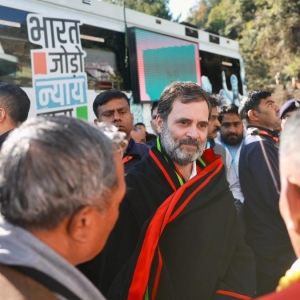
.png) Ram Puniyani
Ram Puniyani

As massive propaganda and mobilisation for the inauguration of the Ram Temple on January 22 is on, there is a need to reflect on India's democratic and secular ethos. We recall that soon after we achieved independence, there was a demand from some quarters that the government restore the Somnath Temple, which was plundered by Mahmood Ghazni in the eleventh century. Nehru writes in his book that "he and Patel also approached Mahatma Gandhi for the reconstruction of the temple, but Gandhi was of the view that the government itself should not make any contribution in the form of money for the same." On similar lines, Nehru, the then Prime Minister, advised the President, Dr Rajendra Prasad, not to inaugurate the temple officially as the President of India. Then, Nehru built the 'Temples of Modern India': dams, public sector industries, health infrastructure, and educational and research institutions.
The country's democracy was strengthened through 'one person, one vote'. Social movements of workers, peasants and other sections of society boosted the democratic space and values. Barring the interlude of the Emergency, the country moved towards gradually strengthening the democratic norms until the temple movement undermined the very 'Idea of India' that had emerged with the freedom movement. The planned installation of Ram Lalla Idols in Babri Mosque and the refusal of the Collector of Faizabad, K. K. Nayyar, sowed the seeds of the issue, which was to emerge as a threat to the values of the Indian Constitution.
The well-planned demolition of Babri Mosque on December 6 paved the way for the Grand Ram Temple, which is coming up now. The political party ruling today has not only focused on issues foreordained to raise emotions but has also been restricting the democratic spaces in the country. The person who played a leading role in the Ram temple movement, Lal Krishna Advani, has called the present times an undeclared Emergency. In the background of overarching emotive issues, aspirations for better living conditions are bypassed by the government. We live in dismal times where rising prices and worsening indices of livelihood are breaking the backs of average people.
Where is the hope for a better future, a future making the path of 'Idea of India', which was the core spirit of the freedom movement, which was the dream of the likes of Bhagat Singh, Subhash Bose, Gandhi and innumerable leaders who sacrificed their lives for the country?
The last few years have displayed some of the latent strength of democracy. As the three oppressive farm laws were introduced, the farmers marched to Delhi in large numbers and stayed put for months, sacrificing nearly 600 of their colleagues in the struggle. They proved that democratic movements could shape the future of society as the farm laws were withdrawn. We then saw the shrewd move of the Central Government in the form of CAA and NRC to disenfranchise a large section of the Muslim population. To oppose this, the remarkable Shaheen Bagh movement came up to show that democratic struggles make the country and can influence the future of India.
The summation of the anguish of people came up in the form of 'Bharat Jodo Yatra' (Unite India March) a year ago. It gave the message of unity in the country, cutting across different religions and ethnicities. It transformed the social atmosphere of despondency into one of hope and drew the nation's attention towards the real issues of society, such as hunger, shelter, and employment, among others. The response of people was as if they had been waiting for such an event to happen so that they could democratically express their pain and deprivations. The hope for an inclusive society with earthly needs was rekindled, and a new ground for national dialogue emerged.
This did make its mark, but the communal forces have by now made very efficient machinery for spreading its propaganda related to the divisive issues, which have nothing to do with the real problems of survival of the people. So, the Ram Temple inauguration is being projected as a big event. All wings of the RSS Combine are putting their energies into mobilising the people through 'Akshat' (sacred yellow rice) as an invitation to participate in the programs around Ram Temple's inauguration. The plans for running extra buses and trains are in the offing to hog the national attention to Lord Ram's temple.
While one is waiting for January 22, when Prime Minister Modi will be putting life (Pran Pratishta) into the idol of Lord Ram, another event is already underway. That is 'Bharat Jodo Nyay Yatra', from Manipur to Mumbai from January 14 to March 20. This hybrid (foot and bus) Yatra began in Manipur, a state neglected by the Central Government, a state which has been suffering from ethnic violence for over seven months. The response to Yatra from the people of Manipur is overwhelming.
This Yatra will focus on Nyay (Justice) as we see injustice all around. The Yatra focuses on unemployment, farmers' issues, rising poverty, women's dignity, and Adivasis's rights. This is probably the best way to highlight people's issues. While most of the media is going gaga around the Ram Temple issue, the need is to spread the message of this Yatra far and wide. The Ram Temple issue is the agenda of RSS-BJP and is strengthening authoritarian politics; the Bharat Jodo Nyay Yatra is articulating the values related to Constitutional morality. It should not be seen as a program of any particular party. It is the summation of the ex
Yatras in India have been essential in preserving inclusive values and reaching the message far and wide. In current times, when the mechanisms of dissemination of thought and political values are controlled by retrograde political formation, this Yatra for justice for all sections of society comes like a breath of fresh air to kindle the lamp of Indian Nationalism.